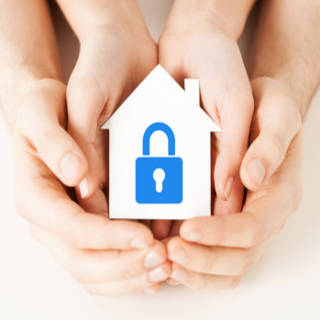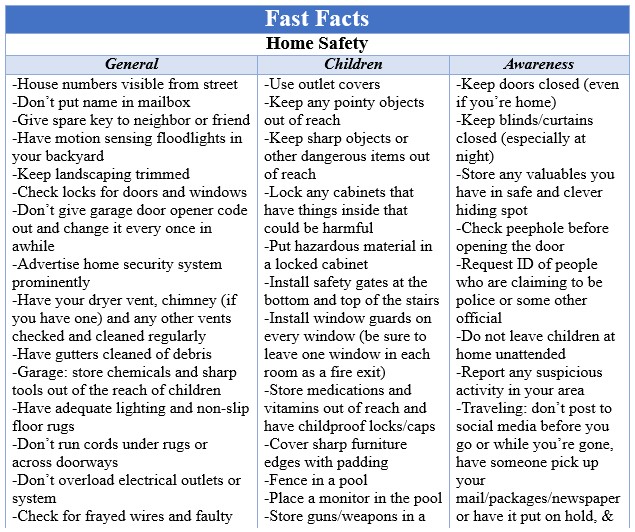What could be wrong with your castle?
“Your home is your castle,” but what happens when your castle is unsafe? When it comes to thinking about home safety, people usually think of one of two things…something is wrong with structure of the house or about feeling safe in your home from the outside world. You expect both. So, how do you make sure that you feel safe at home?
 General
General
At the very minimum, you expect your house to shelter you from the outside elements. However, you probably don’t think of what it takes for your home to be a safe place for you to live. There are several things that you can do to make this possible. Let’s start on the outside of your home. Make sure that your house numbers are visible from the street so emergency personnel can find you easily. Don’t put your name in your mailbox so people aren’t able figure out who lives there just by opening it. Give a spare key to a trusted neighbor or friend that lives nearby rather than in a hide-a-key device. Installing motion sensing floodlights in your backyard will deter people from entering it. Keep your landscaping trimmed and neat to eliminate any potential hiding areas. Check locks for doors and windows to ensure they work properly and can easily be opened in the event of an emergency. If you have a garage door opener with a key pad, don’t give the code to people you don’t know and change it every so often as the number wear away over time giving an indication of what your code might be. If you have a home security system, advertise it prominently. Have your dryer vent, chimney (if you have one) and any other vents checked and cleaned on a regular basis to prevent a fire. If you have gutters, clean out any debris to prevent them from overflowing and leaking inside. In the garage, be sure to store chemicals and sharp tools out of the reach of children.
Moving inside the house, it is important to have adequate lighting and non-slip floor rugs to prevent any falls. Also, don’t run cords under rugs or across doorways so you decrease the chance of tripping. Don’t overload electrical outlets or system with more than it can handle because this can cause a short leading to a fire. Periodically, check for frayed wires and a faulty electrical system. If you have a chimney, make sure you have the right wood, so it doesn’t create a lot of soot. If you have a wood-burning stove, check it twice monthly and check hot water heaters every year. Install smoke and carbon monoxide detectors on each floor of the house and smoke detectors in all sleeping areas. Test the alarms monthly (replace them every 10 years) and change batteries every year or sooner, if alarm chirps. When you test the alarms, vacuum the grille to clear it of any dust. Demonstrate the sounds of the alarms to family members so they know the difference between them. Have a fire extinguisher in the kitchen and on every floor. Know how to use it and replace it according to the manufacturer’s recommendation. In the kitchen, make sure flammable objects are kept away from the stove top and oven. In bathrooms, keep any electrical appliances away from water and use a non-skid bath mat or decals in the tub or shower. For stairs, keep them clear of objects with sturdy rails and make sure they are well lit with switches at the top and bottom. When possible, especially in a basement due the typical lower light level, have the last step be different color than the floor so it will be more visible. In your bedroom, ensure that everything is far enough away from any heat sources, use a flame-resistant mattress and keep a phone, flashlight (there are rechargeable options that can be left in a plug next to the bed) and a weapon (could be a baseball bat or something similar—doesn’t need to be a gun) near the bed.
Children
When you have children in your house, there are numerous additional concerns related to their safety inside your home. It is important to use outlet covers on all outlets and keep any pointy objects that could be stuck in an outlet out of their reach. This also means keeping any sharp objects (knives) or other dangerous cooking utensils out of their reach. Be sure to lock any cabinets that have things inside that you do not want them to have access to and be sure to put any hazardous materials into one of the locked cabinets. Install safety gates at the bottom and top of the stairs in order to prevent any unnecessary falls. Also, install window guards on every window (be sure to leave one window in each room as a fire exit). Make sure that all medications and vitamins are stored out of reach and have childproof locks/caps. If you have any furniture with sharp edges, install padding that covers the edges. If you have a pool, be sure to fence in your yard and have a separate fence around the pool. Also, place a monitor in the pool that will alert you if someone falls in. If you have any guns or weapons, be sure to lock them away. Start teaching gun/weapon safety as early as possible in age appropriate terms. Teach children to never open the door without an adult present. In addition, teach them their address and how to call 911 in the case of an emergency.
Awareness
Besides making sure your home is structurally safe for you and your family, it is important to consider things that you can do in order to keep your home safe. Keep doors closed (even if you’re home) and keep blinds/curtains closed (especially at night). This will limit the ability of a potential intruder from learning your schedule and seeing potential things they might be interested in taking. Make sure to store any valuables you have in safe and clever hiding spot. If someone is at your door, look through the peephole before letting them in and request ID of people who are claiming to be police or some other official. Do not leave children at home unattended. If there is any suspicious activity in your area, report it the police. If you are traveling, don’t post to social media before you go or while you’re gone. This just alerts everyone that you are not home. Have someone pick up your mail/packages/newspaper or have it put on hold. Have someone more your lawn, shovel your driveway/sidewalk or anything else that makes your house looked lived-in to decrease the chances that people realize that you aren’t home.
The feeling that where you are living is unsafe, whether it is due to a structural issue or personal safety issue, is not a good sensation. After following these tips and any of your own that will increase the safety of your home, you will experience the relief of knowing that your home is ready to protect you and your family from any situation.